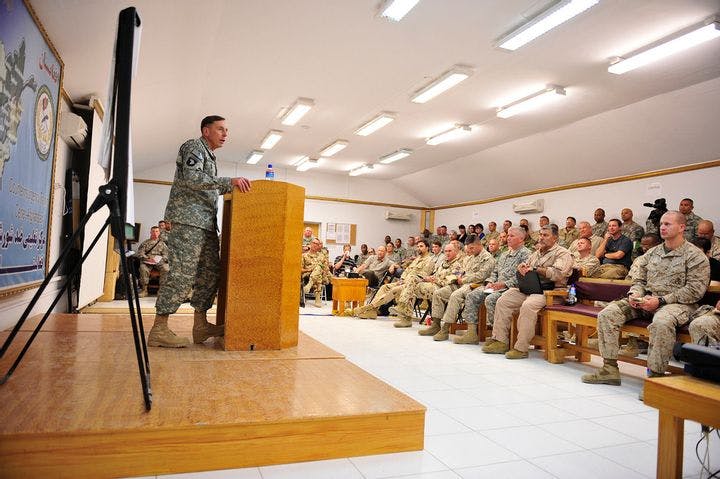Fall 2010
American Conspiracy
– Thomas Rid
Over the past five years, Andrew Bacevich has emerged as one of the most prolific and eloquent critics of American foreign policy.
Over the past five years, Andrew Bacevich has emerged as one of the most prolific and eloquent critics of American foreign policy. In several influential books and essays, Bacevich, a professor of international relations and history at Boston University, has often walked the fine line between scholarship and mass-audience opinionating. As a self-styled realist, he has mostly crafted these positions with detached, historically balanced analysis.
Washington Rules breaks with this trend: It is the passionate, personal, and polemical story of how Bacevich, as an Army officer visiting Berlin in 1990, embarked on an educational journey that led him to discover the ideological roots of America’s path to permanent war. At times Washington Rules articulates a sophisticated critique of the United States’ global ambitions. But with this book, Bacevich is dancing along another line. He now has at least one foot in the murky territory of conspiracy theory.
The first indicator is Bacevich’s obsessive use of dogma and quasi-religious language. The country is run not by presidents and senators, but by something bigger, the “Washington rules.” These rules start with the “credo”: All presidents from Harry S. Truman to Barack Obama have faithfully adhered to a “catechism” of American statecraft founded on four assertions: (1) The world must be organized and “shaped.” (2) America, and only America, has the vision, the will, and the wisdom to lead and enforce this global order. (3) America has articulated the principles that govern the international order, and these principles are, not surprisingly, American ones. (4) The world, despite occasional complaints, wants the United States to lead.
The other half of the Washington rules consists of the “sacred trinity”: the convictions that the United States must maintain a global military presence, that it must configure its forces to project power globally, and that it must counter anticipated threats around the world with interventions. The credo and the trinity—terms Bacevich uses throughout the book—promise prosperity and peace but, in effect, usher in the opposite: insolvency and perpetual war.
Washington Rules imposes a grand and simplifying scheme on a vast set of complex facts. Consider Bacevich’s explanation of the Washington rules’ origins: the cloak-and-dagger world of Cold War spies and the hidden Air Force command centers where cigar-chomping four-star generals devised strategies for nuclear overkill. The most important masterminds were Allen Dulles, the first and most influential director of the CIA, and Curtis LeMay, the first and most influential commander of the Strategic Air Command, the agency that was in charge of nuclear war. These two “semiwarriors,” as Bacevich calls them with a curl of his lip, “left an indelible mark on our age.” He describes how the Washington rules and America’s global footprint survived the defeat in Vietnam as well as the demise of the Soviet Union, aided by legions of semiwarriors on the left and the right, apparently uninfluenced by partisan politics. President Bill Clinton’s secretary of defense, William Cohen, conserved the rules, and his secretary of state, Madeleine Albright, midwifed them into the 21st century. President George W. Bush’s defense team, Donald Rumsfeld and Paul Wolfowitz, applied them in Afghanistan and Iraq.
For Bacevich, there is an obvious “chain of events” that paved the way to 9/11: the overthrow of Mohammad Mossadegh in Iran in 1953; America’s “deference” to Israel after the 1960s; U.S. dealings with Saddam Hussein in the 1980s; Washington’s support for jihadis in Soviet-occupied Afghanistan; and the Gulf War in 1990–91. If George W. Bush had acknowledged the connection between these policies and the fall of the Twin Towers, Washington’s sacred dogma would have been called into question, so he deliberately ignored it. Instead, under the Bush administration, the standard of debate fell to a level “hitherto achieved only by slightly mad German warlords.”
For Andrew Bacevich, there is an obvious chain of events that paved the way to 9/11.
Bacevich carefully acknowledges that the Washington “elite” is not all-knowing and often just doesn’t get it. Yet, especially when he discusses recent examples, he unearths willful deceit. General David Petraeus’s counterinsurgency doctrine, for instance, is dismissed as “counterfeit coin,” a strategy that only gives the appearance of purpose to military activity, and in truth is a recipe for more and more wars in the various broken quarters of the world. Bacevich dismisses the threat of Islamic terrorism in a nonchalant way, shrugs off the geopolitical relevance of the Middle East and Central Asia, and disregards mad dictators eager to get their hands on nuclear weapons. Osama bin Laden, Saddam Hussein, and Kim Jong Il are ridiculed as not more than “a motley collection of B-list foes”; North Korea, Syria, and Cuba are derided as “pygmies.” America and its allies seem to have no A-list enemies. Consequently, there is no need for Bacevich to suggest alternative policies beyond just “getting out.”
This book is a pity. U.S. foreign policy in the Middle East and Central Asia, driven by ideology and now hope, is indeed producing more and more questionable outcomes. An authoritative and constructive critique by an outsider with an insider’s knowledge would be highly welcome. Washington Rules offers a few illuminating glimpses, but no balanced view. Bacevich ends up doing a great service to his reviled semiwarriors by handing them a straw man they will manage to shoot down with ease.
* * *
Thomas Rid is a visiting scholar at the University of Konstanz in Germany and was a public policy scholar at the Woodrow Wilson Center in 2009. His most recent book, Understanding Counterinsurgency, was published earlier this year.
Reviewed: Washington Rules: America's Path to Permanent War by Andrew J. Bacevich, Metropolitan Books, 286 pp, 2011.
Photo courtesy of the International Security Assistance Force
